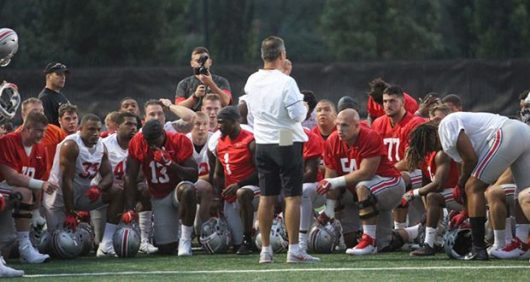
Ohio State coach Urban Meyer addresses the Buckeyes prior to the first practice of fall camp on July 27. Credit: Colin Hass-Hill | Sports Editor
The Ohio State football team was just 2 1/2 weeks into the start of fall camp and had reached the halfway point between the start of camp and kickoff for its first game of the season.
Then on the weekend of Aug. 12-13, a group of neo-Nazis, white nationalists and the Ku Klux Klan marched on Charlottesville, Virginia, in a rally called “Unite the Right” to protest the proposed removal the statue of Confederate Gen. Robert E. Lee from a city park.
But rather than view the events going on around them as nothing more than background noise, coach Urban Meyer said he spent time talking with all of his players, trying to make sure they do what they can to control everything in front of them.
“We’ve had a couple conversations with what happened in Virginia. It was everywhere. You know, we were kind of buried in training camp,” Meyer said. “There were some tough things going on right here, and we’ve kind of taken the approach — it started last year, and Live Life Wednesdays — was you can’t really control what’s going on out there, but you can be a shining light and kind of a role model for the way you handle your business.”
Meyer added though there was a lot going on at the time for his players to be paying attention to, he was impressed by the way they were able to handle the situation.
“(You) can’t control Virginia, but you can control what goes on here within the family,” Meyer said.
The incident at Charlottesville was by no means the beginning of the political discussions within the Ohio State football team. Though debates within the locker room have raged on for a while, the 2016 presidential election proved to be a catalyst for political discourse among members of the team.
“There’s political debates all the time. Especially when, before the election. We used to argue bad about it, actually,” defensive end Jalyn Holmes said. “We can have a full-blown argument and then, you know, tell a joke afterward.”
Managing off-field discussions of political issues could potentially pose challenges for a coaching staff.
But defensive line coach Larry Johnson said his team does not take the approach of keeping controversial topics quiet. Instead, he embraces the opportunity to discuss the issues with his players, and sees them as chances for his players to grow and mature.
“We’ll spend 20 minutes before we talk football just talking about what’s going on in today’s world,” Johnson said. “And just how to be a young man, how to grow up. I think those factors are important. Not just to football players, but growing a young man from the inside out.”
Johnson said every day Meyer will speak about some pertinent issues in the world, and that other coaches — including Johnson — hold open discussions with players about issues deemed controversial by many.
He added the coaching staff will discuss those issues along with other bits of information about how players can improve not only at football, but develop more as individuals.
“That’s what I think makes college football so unique,” Johnson said, “And makes this relationship you have with coaches and players so unique because you can talk more than football.”
Though teammates might see issues differently and have disagreements among each other, they know that everyone is entitled to their own opinion and that they all need to respect and support their teammates regardless of their various stances on the issues at hand.
“At the end of the day, we’re teammates,” Holmes said. “Somebody could like (President Donald) Trump, somebody could not like Trump. At the end of the day, I’ve got to respect your opinion, you’ve got to respect mine.”


